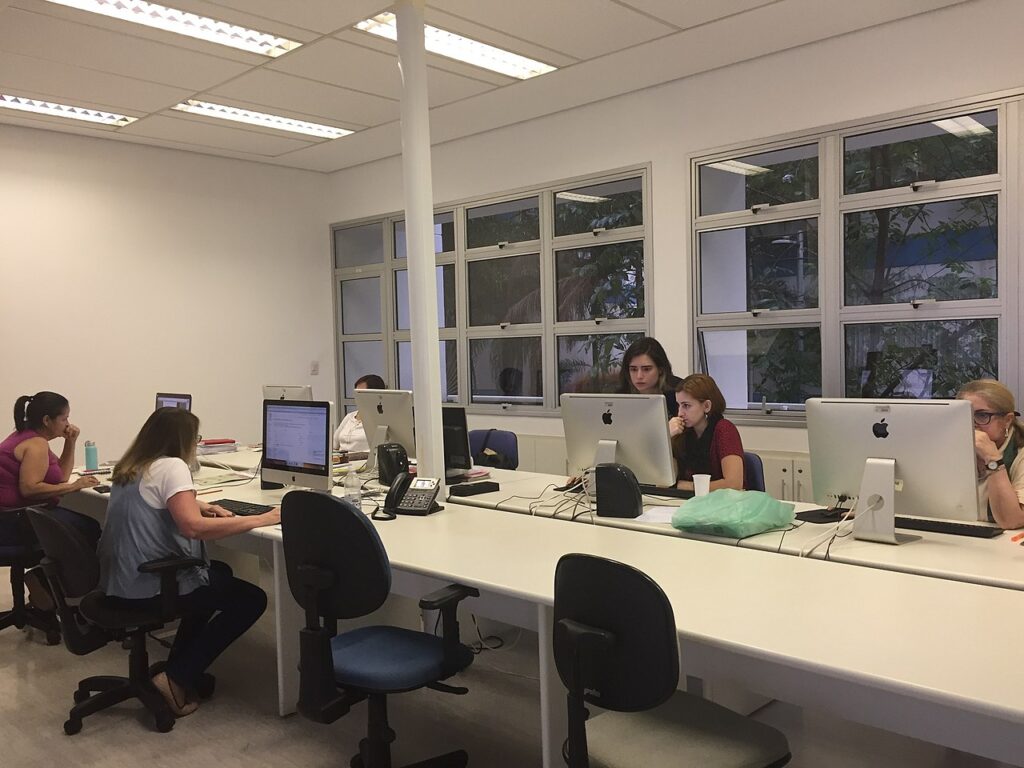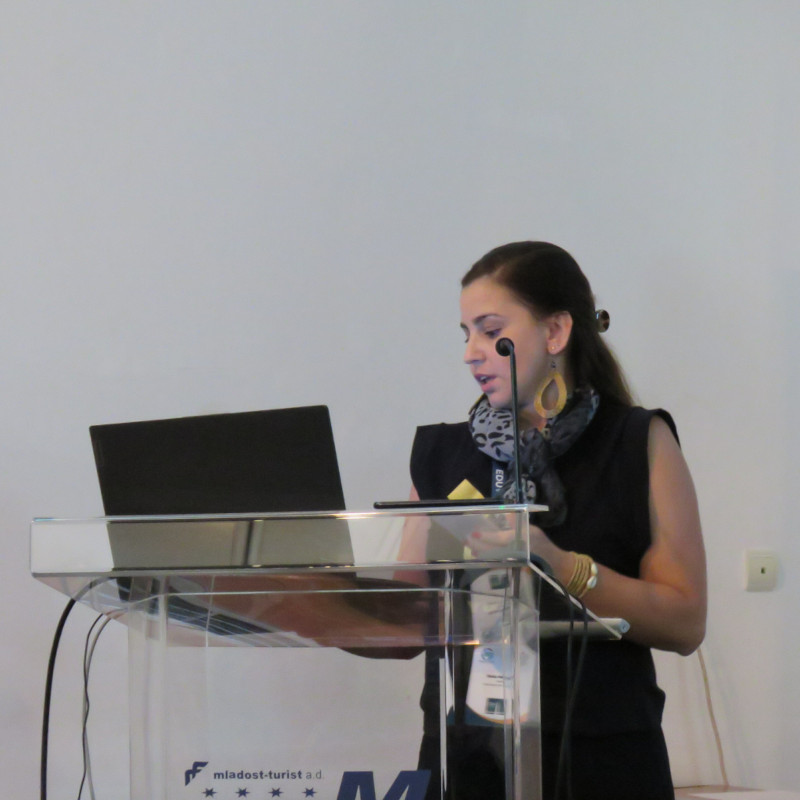A model for open knowledge
Stela Madruga, head librarian at the Institute of Mathematics and Statistics at the University of São Paulo (USP) in Brazil, began her journey with Wikimedia Projects in 2019: “The library where I work hosted a ‘Wikipedian Librarians’ event. It was initiated by a professor and his outreach team. The workshop aimed to teach USP librarians the basics of editing Wikipedia and to present possibilities for promoting collections.” That event was a catalyst for Madruga to engage more deeply with Portuguese Wikipedia and Wikidata editing. In 2020, her involvement with Wikimedia activities connected her with João Peschanski, CEO of Wiki Movimento Brasil (WMB).

WMB is a nonprofit organization, currently made up of 17 staff and 8 contractors, dedicated to expanding, improving, and diversifying the content and community of Wikimedia projects, especially in Brazil. Funded primarily by grants from the Wikimedia Foundation, similar organizations exist in the US, including Art+Feminism, Wiki Education, and AfroCROWD. What makes WMB unique is the more recent focus on libraries, which is based on their successful, ongoing partnerships with museums. In 2023, WMB began the first stage of a three-year initiative to partner with libraries in Brazil to expand the reach of open knowledge.
Open knowledge refers to information that is freely accessible, reusable, and distributable by anyone, without legal, social, or technical restrictions. This concept aligns with the mission of Wikimedia projects, which aim to make “the sum of all human knowledge” freely available to everyone. WMB has identified libraries as crucial partners in improving the Wikimedia global repository with local Brazilian knowledge—a big project for a country with over 5,000 cities. Together, WMB and libraries in Brazil are working to provide equitable access to information and foster a culture of shared learning and collaboration.
Wikimedia in Brazil
Wikimedia, the umbrella term for a range of collaborative projects including Portuguese Wikipedia, English Wikipedia, Wikimedia Commons, and Wikidata, is a significant source of information in Brazil. Last month, June 2024, Wikimedia projects recorded over 319 million page views from Brazil alone.
Focusing on Portuguese, Brazil’s national language, we can see that Brazilians account for the majority of both users and creators of Portuguese Wikipedia. In June 2024, there were 313 million page views of Portuguese Wikipedia. A substantial, 57 percent of these views, amounting to 179 million, originated from Brazil. This demonstrates the importance of Wikipedia in Brazil. In contrast, 8 percent of views (24 million) came from Portugal, and 1 percent (approximately 4 million) from the US. Wikipedia is a crowdsourced repository, and volunteer editors are distributed around the globe. In June 2024, over 3,000 active editors were engaged with Portuguese Wikipedia; over 2,000 were located in Brazil, and 200 were in Portugal.
Libraries in Brazil
The WMB Libraries Strategic Committee was formed in 2023. Coordinated by WMB staff, it has six members: two academic librarians in Brazil, two academic librarians in the US (I am one of two), a program officer at the Wikimedia Foundation, and the Secretary of Culture in the State of Espírito Santo in Brazil. We’ve had three meetings in the last year, hosted in Portuguese with simultaneous translation in English.
In the charge for the library committee, WMB briefly describes the library landscape in Brazil. In 2020, there were 5,293 public libraries in Brazil—a drop from 6,057 in 2015. While 98 percent of public libraries have collections, only 6 percent provide online digital collections. Libraries can and do use Wikimedia projects, such as WikiSource and Wikimedia Commons, to share digital collections—a low or no-cost alternative when compared to institutional repositories.
WMB and Libraries
Over the last several years WMB has worked diligently to engage with libraries. Activities include:
- Establishing a partnership with three libraries at the University of São Paulo, one of which is headed by Stela Madruga.
- Establishing a partnership with a public school library in the community of Jardim América, a neighborhood in Rio de Janeiro.
- Creating a website for dissemination and engagement with Brazilian libraries.
- Promoting and hosting 16 in-person events in April at public libraries across Brazil for the #EveryBookItsReader Wikimedia global campaign.
- Making materials from the Brazilian National Archives openly available—viewed millions of times each month, according to the project’s dashboard.
Wikipedia and the Daily Work of a Library in São Paulo
Another librarian at the University of São Paulo, Lilian Viana, describes several ways that staff at her library connect library collections and Wikipedia:
“In the library where I work, we write and improve articles in Wikipedia. First, we use our collection (not exclusively) to add quality information to Wikipedia. Although this does not bring people to our library, it brings our collection to the people, which I think is important. Second, we improve articles about professors and researchers at our university by adding links to their work in our institutional repository and by adding openly licensed photos to Wikimedia Commons, which can then be added to their Wikipedia articles. A third way we connect our collection to Wikipedia is by adding materials from our archival collections. For example, we hold unpublished manuscripts from the Brazilian composer Lycia de Biase Bidart and we added a note to her Wikipedia article to direct readers to our catalog, “Para ver a relação completa das obras doadas, acesse o catálogo Partituras da Universidade de São Paulo. Os manuscritos estão sendo digitalizados, e parte da coleção já está disponível em pdf no catálogo” [translation: To see the complete list of donated works, access the sheet music catalog of the University of São Paulo. The manuscripts are being digitized, and part of the collection is already available in PDF format.]

Learning from the WMB and Libraries Connection
The evolving collaboration between WMB and Brazilian libraries not only enriches the global Wikimedia repository with local knowledge but also serves as a model for future initiatives outside Brazil. João Peschanski, CEO of WMB, is a long-time supporter of collaboration between Wikimedia projects and libraries. In 2021, he coauthored a chapter for the edited volume Wikipedia and Academic Libraries: A Global Project. His chapter, “Structuring Bibliographic References: Taking the Journal Anais do Museuo Paulista to Wikidata,” provides another example of how libraries can effectively engage with Wikimedia projects for mutual benefit.
Stela Madruga, a librarian mentioned earlier, emphasized the importance of these collaborations, “Participating in Wikipedia projects promotes a sense of community and collaboration, something I consider fundamental for libraries—after all, a library is a community, building valuable networks and partnerships.”
About the author: Laurie Bridges is an instruction and digital initiatives librarian at Oregon State University. She is a founding member of the Wikimedia #EveryBookItsReader campaign, co-editor of the 2021 open access book Wikipedia and Academic Libraries: A Global Project, and uses Wikipedia in information literacy instruction.
By: Camila Bernardes | Institutional Support Service
Original post from An Open Knowledge Partnership: Wiki Movimento Brasil and Libraries

